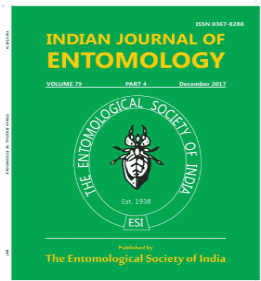Efficacy of Extracts of Bishop's Flower Ammi majus against Black Bean Aphid Aphis fabae Scopoli
DOI:
https://doi.org/10.55446/IJE.2024.1953Keywords:
Aphis fabae, Ammi majus, nymph, adults, Bishop's flower, leaf, pest control, extracts, mortality rate, phytochemical, hot water, cold water, alcohol extracts, bioassayAbstract
Experiments were performed in the laboratory of the Biological Control Department at the Al-Mussaib Technical College during February-July, 2023 for evaluating the efficacy of crude aqueous and alcoholic extracts of flowers and leaves of Bishop’s flower Ammi majus against the black bean aphid, Aphis fabae Scopoli, results revealed that the hot water extract proved superior to cold water extract and hot water extract of flowers was superior compared to leaf extract with mortality of 29.7% nymphs and adults 19.6% respectively.
Downloads
Metrics
Downloads
Published
How to Cite
Issue
Section
References
Almogdad M, Semaškienė R. 2021. The occurrence and control of black bean aphid (Aphis fabae Scop.) in broad bean. Zemdirbyste-Agriculture 108(2).
Al-Rawi K M, Allah A A. 2000. Design and analysis of agricultural experiments. Ministry of Higher Education and Scientific Research. University of Al Mosul. Dar Al-Kut for Publishing.
Barhi ZR, Rashid YD. 2022. Effects of crude alkaloid compounds extract of Ammi majus leaves and flowers on some aspects of biological performance Oryzaephilus surinamensis (Coleoptera: Silvanidae). Revis Bionatura 8(2): 40.
Bennour C, Belgacem A B, Nasr H B. 2021. A review of the management of Aphis fabae Scopoli (Hemiptera: Aphididae). Journal of Oasis Agriculture and Sustainable Development 3(1): 32-44.
Harborne J B, Harborne J B. 1973. Phenolic compounds. Phytochemical methods: A guide to modern techniques of plant analysis. pp. 33-88.
Hossain M A, Al Touby S. 2020. Ammi majus an endemic medicinal plant: a review of the medicinal uses, pharmacological and phytochemicals. Annual Toxicology 1(2): 9-14.
Kaboodi P S, Moghadamnia A A, Bakhshi D, Sefidgar A A. 2017. A study of phytochemical properties of various extracts of Ammi majus fruit using GC-MS technique. Ecology, Environment and Conservation 23(1): 150-155.
Matthews G, Bateman R, Miller P. 2014. Pesticide application methods. John Wiley & Sons.
Mkindi A G, Tembo Y L, Mbega E R, Smith A K, Farrell I W, Ndakidemi P A, Stevenson P C, Belmain S R. 2020. Extracts of common pesticidal plants increase plant growth and yield in common bean plants. Plants 9(2): 149.
Mohammed A A, Kadhim J K, Hasan A M. 2019. Laboratory evaluation of entomopathogenic fungi for controlling Khapra beetle (Coleoptera: Dermestidae) and their effects on the beetles' fecundity and longevity. Journal of Agricultural and Urban Entomology 35(1): 1-11.
Youssef M M A, El-Nagdi W M A. 2023. Eco-friendly biocontrol of root-knot nematode, Meloidogyne incognita in cowpea using fresh leaves and flowers of khella (Ammi majus). Pakistan Journal of Nematology 41(2): 101-107.
Singh R, Singh G. 2021. Aphids. Polyphagous pests of crops. pp. 105-182.
Velavan S. 2015. Phytochemical techniques-a review. World Journal of Science and Research 1(2): 80-91.















